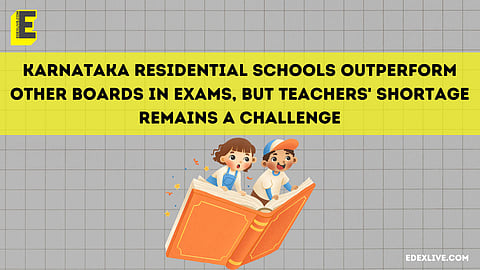

Even though Karnataka’s KREIS (Karnataka Residential Educational Institutions Society) schools continue to outperform others in board exam results, they are grappling with a serious shortage of teaching staff with just 9,000 teachers managing over 2.12 lakh students.
The demanding nature of these postings is deterring teachers from accepting these posts, officials from the social welfare department, which manages these schools, said, urging the government to offer incentives or increase salaries to attract and retain qualified staff.
This year, despite these challenges, the schools recorded a 91% pass rate in SSLC exams — well above the state average of 62.34% — and 91.64% in 2nd PU results, far ahead of the 57.11% recorded by government colleges, stated a report by The New Indian Express.
KREIS schools — around 822 in number — mostly includes students from extremely disadvantaged backgrounds, including children of sanitation workers, nomadic tribes, ex-Devadasis, rescued bonded labourers and other vulnerable communities.
Many are first-generation learners. Yet, they have managed to secure 34.10% distinctions and 55.90% first-class results. The average score has climbed from 71.54% last year to 78% this year, and 71 students were among the top scorers.
Officials attribute this success to the KREIS' holistic support system. Unlike regular government schools, these institutions provide for every basic need — from toiletries to uniforms and textbooks — all at no cost. By removing daily struggles, the schools allow students from Classes 6 to 12 to focus entirely on learning, while building confidence and self-discipline in a residential environment.
Officials, however, warn that the achievements could be under strain in the longer run as 9,000 teachers manage over two lakh students — a shortfall that is putting immense pressure on staff and threatens to dilute the quality of education, they said.
“Many teachers opt out of KREIS postings because the workload is high and the pay is poor,” a teacher working at one of these schools in Koppal said. If this continues, larger class sizes and staff burnout will become the norm and the only way to contribute to a school's success is by improving salaries or offering incentives to attract skilled educators, the teacher said.
This year, the department also took a significant step by facilitating the admission of orphaned children directly into KREIS schools, with 50% of seats reserved for them without the need for entrance exams. This aims to protect vulnerable children from exploitation and guarantees them free education from Class 6 through Class 12.
While this is a positive step towards inclusivity, teachers argue that the government must also address the underlying issues affecting them. “Without improvements in teacher pay and working conditions, the system could face further challenges, with a growing teacher shortage leading to potential declines in the quality of education. The government should consider measures to support both students and teachers to ensure the long-term sustainability of this important initiative,” another teacher posted in Mysuru said.
